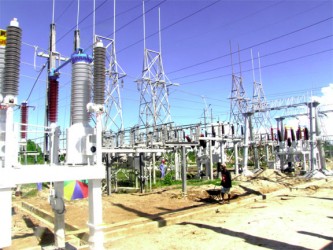Guyana’s manufacturing sector remains restricted to “primary processing of agricultural, mineral and forest products” on account of meagre local demand, high energy and transportation costs and inadequate, unaffordable and non-incentivised financing, Guyana Manufac- turing & Services Association (GMSA) President Clinton Williams told the Association’s Annual Dinner & Awards Ceremony last evening.
High energy costs have been a recurring theme in the manufacturing sector’s protestations to government and in the face of the political hurdles, which hydropower plans have hit, Williams has again called for interim measures designed to incentivise businesses that are prepared to invest in alternative energy sources. “Whereas the best long-term solution is indeed renewable and stable hydro power, we have recommended that additional incentives be provided for solar, wind and biomass producers,” he told the awards ceremony.
Williams said the manufacturing sector was also being inhibited by “The very high trade transaction costs coupled with inordinate customs delays in both import and export transactions. This, however, can be eliminated or substantially reduced with the implementation of the Single Window Automated Processing System (SWAPS), which is currently being implemented. It needs to be accelerated.” Williams declared.

And according to the GMSA President, the manufacturing sector is also being retarded by “the absence of specific funding institutions geared to promote manufacturing, such as a development bank, and the non-existence until recently of a bona fide Credit Bureau to establish the creditworthiness of local entrepreneurs.
“Without being prejudicial to the current Go-Invest Institutional framework, there is dire need for a comprehensive review and possibly revamping of existing mechanisms in this vital investment promotion agen-cy if we are to successfully modernise our accommodation of new manufacturing businesses in Guyana,” Williams told the gathering. Stabroek Business understands that the investment agency is to undergo major operational and leadership changes which are likely to be announced shortly.
Meanwhile, the GMSA President is advocating several other changes to the current environment in order to ensure the revival of the manufacturing sector. These include an end to the sector’s reliance “on old and obsolete technology,” an increase in the range and quantity of fiscal and financial incentives for locally manufactured products, the institution of “comprehensive and enforceable steps” to curtail competition from smuggled goods and the suppression of “dumping by wide-scale importation of cheaper foreign goods, aided by the non-application of quality standard requirements.” He said local regulatory agencies must begin to apply “incentives and disincentives… to ensure compliance with quality assurance and reliability standards.”
Specifically, Williams said the Guyana National Bureau of Standards (GNBS) needs wider testing capacity in order to meet international demand for more quality assurance and accreditation.
He announced that he is seeking “special incentives… to facilitate a significant paradigm shift in our business culture to accelerate growth through the conversion of traditionally family owned businesses to partnerships and joint ventures, both foreign and local.”
And in response to the sustained protestations of the private sector over a scarcity of skills the GMSA President said there is need for “the implementation of a continuous labour market intelligence survey.” And this should be complemented by the accelerated implementation of competency-based and entrepreneurial skills training and development programmes in public and private education curricula. Williams also wants the private sector to “lend support to the introduction of a national training levy… and the establishment of a skills bureau to broker specialized and emerging technical skills.”
And Williams says that the manufacturing sector wants to see government ensure that state-run service providers like the Environmental Protection Agency (EPA) and the GNBS are adequately resourced “to prepare local manufacturers for immediate compliance with emerging Environmental Management Standards generated by international agencies and demanded by importing countries.”




